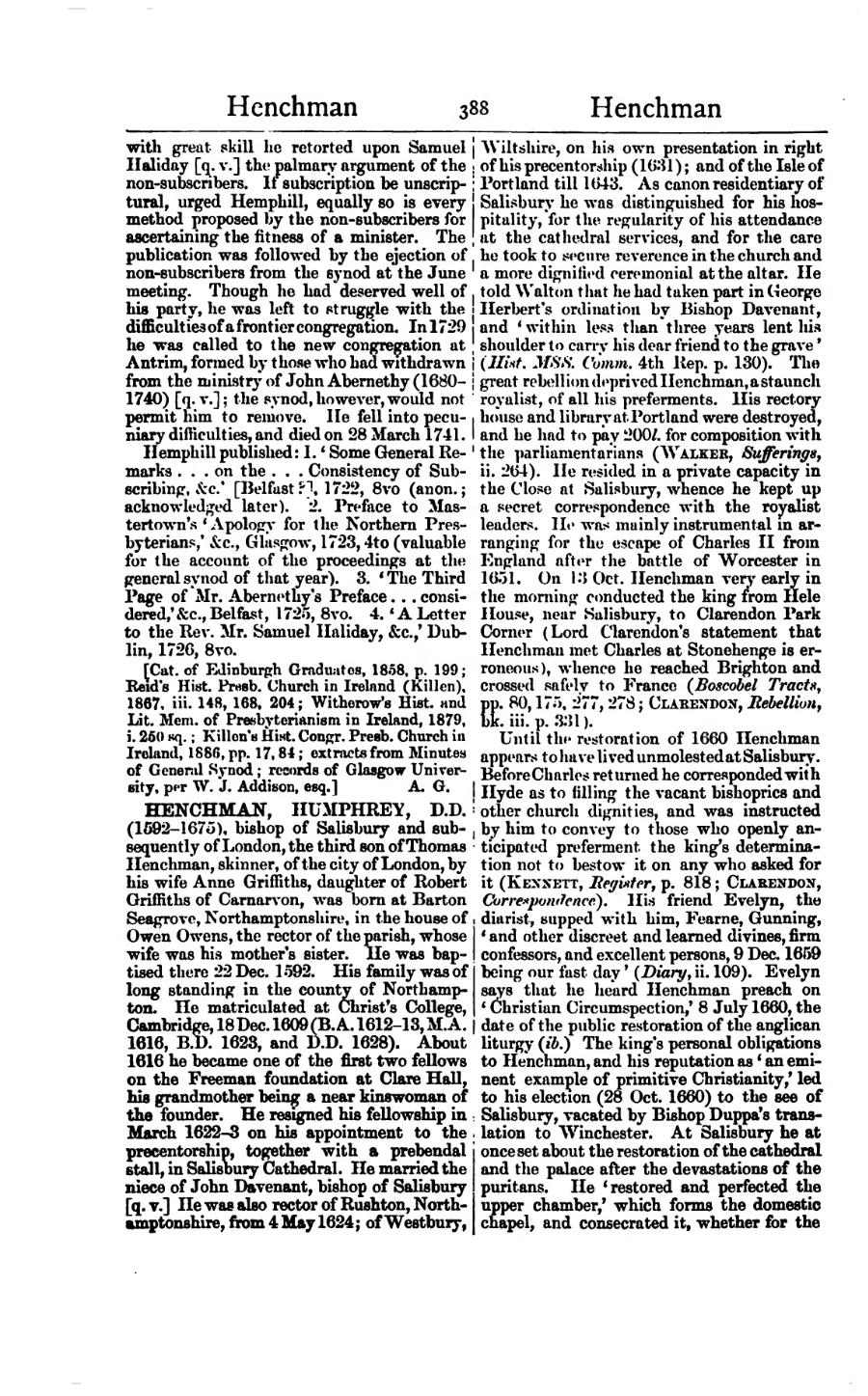with great skill he retorted upon Samuel Haliday [q. v.] the palmary argument of the non-subscribers. If subscription be unscriptural, urged Hemphill, equally so is every method proposed by the non-subscribers for ascertaining the fitness of a minister. The publication was followed by the ejection of non-subscribers from the synod at the June meeting. Though he had deserved well of his party, he was left to struggle with the difficulties of a frontier congregation. In 1729 he was called to the new congregation at Antrim, formed by those who had withdrawn from the ministry of John Abernethy (1680–1740) [q. v.]; the synod, however, would not permit him to remove. He fell into pecuniary difficulties, and died on 28 March 1741.
Hemphill published: 1. ‘Some General Remarks … on the … Consistency of Subscribing, &c.’ [Belfast?], 1722, 8vo (anon.; acknowledged later). 2. Preface to Mastertown's ‘Apology for the Northern Presbyterians,’ &c., Glasgow, 1723, 4to (valuable for the account of the proceedings at the general synod of that year). 3. ‘The Third Page of Mr. Abernethy's Preface … considered,’ &c., Belfast, 1725, 8vo. 4. ‘A Letter to the Rev. Mr. Samuel Haliday, &c.,’ Dublin, 1726, 8vo.
[Cat. of Edinburgh Graduates, 1858, p. 199; Reid's Hist. Presb. Church in Ireland (Killen), 1867, iii. 148, 168, 204; Witherow's Hist. and Lit. Mem. of Presbyterianism in Ireland, 1879, i. 250 sq.; Killen's Hist. Congr. Presb. Church in Ireland, 1886, pp. 17, 84; extracts from Minutes of General Synod; records of Glasgow University, per W. J. Addison, esq.]
HENCHMAN, HUMPHREY, D.D. (1592–1675), bishop of Salisbury and subsequently of London, the third son of Thomas Henchman, skinner, of the city of London, by his wife Anne Griffiths, daughter of Robert Griffiths of Carnarvon, was born at Barton Seagrove, Northamptonshire, in the house of Owen Owens, the rector of the parish, whose wife was his mother's sister. He was baptised there 22 Dec. 1592. His family was of long standing in the county of Northampton. He matriculated at Christ's College, Cambridge, 18 Dec. 1609 (B.A. 1612–13, M.A. 1616, B.D. 1623, and D.D. 1628). About 1616 he became one of the first two fellows on the Freeman foundation at Clare Hall, his grandmother being a near kinswoman of the founder. He resigned his fellowship in March 1622–3 on his appointment to the precentorship, together with a prebendal stall, in Salisbury Cathedral. He married the niece of John Davenant, bishop of Salisbury [q. v.] He was also rector of Rushton, Northamptonshire, from 4 May 1624; of Westbury, Wiltshire, on his own presentation in right of his precentorship (1631); and of the Isle of Portland till 1643. As canon residentiary of Salisbury he was distinguished for his hospitality, for the regularity of his attendance at the cathedral services, and for the care he took to secure reverence in the church and a more dignified ceremonial at the altar. He told Walton that he had taken part in George Herbert's ordination by Bishop Davenant, and ‘within less than three years lent his shoulder to carry his dear friend to the grave’ (Hist. MSS. Comm. 4th Rep. p. 130). The great rebellion deprived Henchman, a staunch royalist, of all his preferments. His rectory house and library at Portland were destroyed, and he had to pay 200l. for composition with the parliamentarians (Walker, Sufferings, ii. 264). He resided in a private capacity in the Close at Salisbury, whence he kept up a secret correspondence with the royalist leaders. He was mainly instrumental in arranging for the escape of Charles II from England after the battle of Worcester in 1651. On 13 Oct. Henchman very early in the morning conducted the king from Hele House, near Salisbury, to Clarendon Park Corner (Lord Clarendon's statement that Henchman met Charles at Stonehenge is erroneous), whence he reached Brighton and crossed safely to France (Boscobel Tracts, pp. 80, 175, 277, 278; Clarendon, Rebellion, bk. iii. p. 331).
Until the restoration of 1660 Henchman appears to have lived unmolested at Salisbury. Before Charles returned he corresponded with Hyde as to filling the vacant bishoprics and other church dignities, and was instructed by him to convey to those who openly anticipated preferment the king's determination not to bestow it on any who asked for it (Kennett, Register, p. 818; Clarendon, Correspondence). His friend Evelyn, the diarist, supped with him, Fearne, Gunning, ‘and other discreet and learned divines, firm confessors, and excellent persons, 9 Dec. 1659 being our fast day’ (Diary, ii. 109). Evelyn says that he heard Henchman preach on ‘Christian Circumspection,’ 8 July 1660, the date of the public restoration of the anglican liturgy (ib.) The king's personal obligations to Henchman, and his reputation as ‘an eminent example of primitive Christianity,’ led to his election (28 Oct. 1660) to the see of Salisbury, vacated by Bishop Duppa's translation to Winchester. At Salisbury he at once set about the restoration of the cathedral and the palace after the devastations of the puritans. He ‘restored and perfected the upper chamber,’ which forms the domestic chapel, and consecrated it, whether for the
